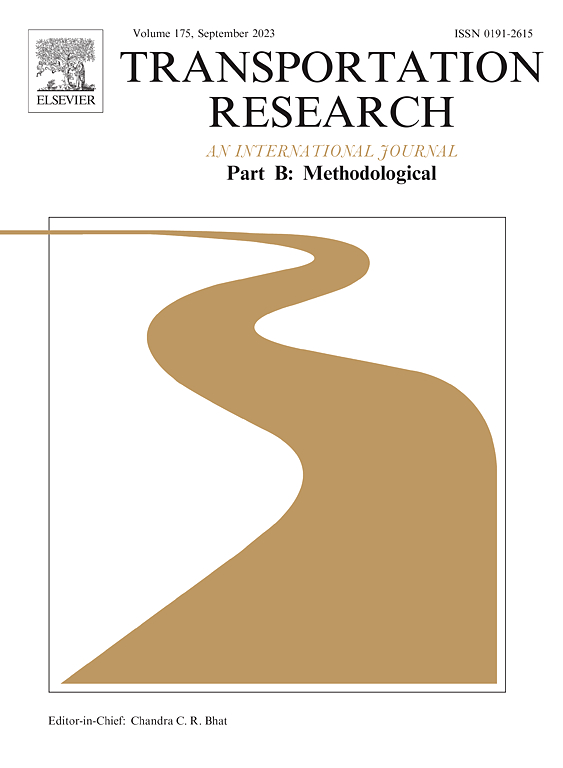利用有限数据生成 COVID-19 期间的在线货运需求
IF 5.8
1区 工程技术
Q1 ECONOMICS
引用次数: 0
摘要
城市货运数据分析对于知情决策、资源分配和优化路线至关重要,可帮助城市实现高效、可持续的货运运营。在 COVID-19 大流行的部分推动下,网上购物送货上门的步伐明显加快。然而,由于缺乏公共数据,应对这一发展一直是一项挑战。由于调查参与者未作回复,现有数据可能并不频繁。针对这一缺陷,我们开发了数据估算和复制算法,在有限的地面真实在线货运交付数据的基础上,预测未来城市货运需求。我们的通用框架能够接受重复的横截面调查,并从中复制频繁的样本。在本文中,我们的案例研究侧重于普吉特海湾地区委员会(PSRC)仅限于华盛顿州西雅图-塔科马-贝尔维尤大都会统计区(MSA)的家庭旅行调查(HTS)数据。我们展示了如何通过在缺失的在线交付量样本和可用的在线交付量样本之间进行基于相似性的匹配,根据地面真实值对旅行调查数据集中缺失的在线货运交付量进行估算。经验分析和理论分析都证明了估算的高真实性,估算的货运量与地面真实值非常接近。利用所获得的基于相似性的匹配,我们展示了如何在未来和过去的旅行调查数据集之间生成数据,重点是在数据集之间保持一些一致的趋势。这项工作通过最大限度地利用现有的稀缺数据来生成合理的估计值,从而促进政策决策的制定,推动了现有的货物交付需求估计方法的发展。本文章由计算机程序翻译,如有差异,请以英文原文为准。
Generating online freight delivery demand during COVID-19 using limited data
Urban freight data analysis is crucial for informed decision-making, resource allocation, and optimizing routes, leading to efficient and sustainable freight operations in cities. Driven in part by the COVID-19 pandemic, the pace of online purchases for at-home delivery has accelerated significantly. However, responding to this development has been challenging given the lack of public data. The existing data may be infrequent because of survey participant non-responses. This data paucity renders conventional predictive models unreliable.
We address this shortcoming by developing algorithms for data imputation and replication for future urban freight demand given limited ground truth online freight delivery data. Our generic framework is capable of taking in repeated cross-sectional surveys and replicating frequent samples from them. In this paper, our case study is focused on Puget Sound Regional Council (PSRC) household travel survey (HTS) data restricted to the Seattle–Tacoma–Bellevue, WA Metropolitan Statistical Area (MSA). We show how to impute the missing online freight deliveries in our travel survey dataset from ground truth values by making a similarity-based matching between the samples of missing and available online delivery volumes. Empirical and theoretical analyses both demonstrate high veracity of imputation where the estimated freight delivery volumes closely resemble the ground truth values. Utilizing the obtained similarity-based matching, we show how to generate data across future and past travel survey datasets with an emphasis on maintaining some consistent trends across the datasets. This work furthers existing methods in demand estimation for goods deliveries by maximizing available scarce data to generate reasonable estimates that could facilitate policy decisions.
求助全文
通过发布文献求助,成功后即可免费获取论文全文。
去求助
来源期刊
CiteScore
12.40
自引率
8.80%
发文量
143
审稿时长
14.1 weeks
期刊介绍:
Transportation Research: Part B publishes papers on all methodological aspects of the subject, particularly those that require mathematical analysis. The general theme of the journal is the development and solution of problems that are adequately motivated to deal with important aspects of the design and/or analysis of transportation systems. Areas covered include: traffic flow; design and analysis of transportation networks; control and scheduling; optimization; queuing theory; logistics; supply chains; development and application of statistical, econometric and mathematical models to address transportation problems; cost models; pricing and/or investment; traveler or shipper behavior; cost-benefit methodologies.

 求助内容:
求助内容: 应助结果提醒方式:
应助结果提醒方式:


